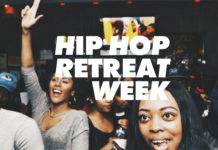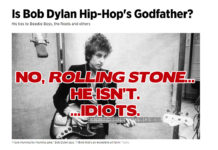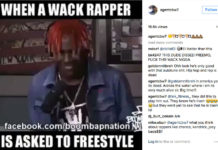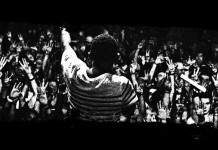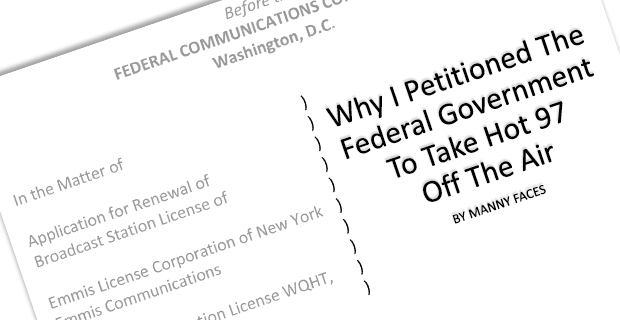
Many have been unsatisfied with how New York’s iconic radio station has represented hip hop music and culture in recent years. Turns out, there’s something you can do about that. So I did.
UPDATE: Hot 97, Chuck D, The FCC and Me: An Update on the Filed FCC Petition to Take Hot 97 Off The Air
As a corporate owned, commercial FM radio station, WQHT (Hot 97) has little obligation other than to turn a profit for the shareholders of their parent company, the Indiana-based Emmis Communications.
The station’s music director, program director and general manager have little obligation other than to program music and content that will attract and keep the greatest amount of listeners tuned in, preferably listeners who are between 18 and 34 years old.
They have little obligation regarding the content of that content, so long as it falls within the guidelines of the Federal Communications Commission (FCC) and is not considered indecent.
All of this makes typical objections against commercial radio in general, and Hot 97 in particular, extremely invalid. After all, while there is no accounting for taste, if people are listening, and advertisers are paying, and nothing is considered “indecent,” there really isn’t anything else a radio station has to do but continue to rake in the dough.
Except for one thing.
Hot 97 is the self-proclaimed place “Where Hip Hop Lives.”
And “hip hop,” contrary to some belief, and contrary, it would appear, to what Hot 97 seems to think, is more than a genre of music.
It is a culture.
And that changes things.
The Pre-Game
Nearly 8 years ago, I sat awake in bed at night working on a business plan for a magazine I wanted to create. As a longtime rap fanatic, I had nearly run the gamut of hip hop participation, and while there were moments when I brushed with success in the music business game, life led me instead down a path to journalism and new media.
It was the combination of success in that corporate career, never straying far from my hip hop participatory roots, and several a-ha realizations that led me to desire starting a hip hop magazine that focused on New York hip hop. Among them:
- New York hip hop, everyone said, was on life-support, moments from expiration.
- That might actually not be true.
- While part of why everyone thought it was dying was due to the regional rise of other areas of the country and the un-imaginative, follow-the-leader methods of the starting-to-fall-apart music industry, I suspected that the real problem with New York hip hop was…
- The media.
With rap’s Southern flight also went the attention of most rap business, including rap journalism. Hip hop’s music and culture media were already starting to show signs of collapsing into the useless oblivion they currently reside in, and the void they left behind to jump on the strip club culture of the South’s bands-wagon (pun intended), shrouded the entire New York-area hip hop scene in a misunderstood, under-represented, negatively-stereotyped fog, leaving the rest of the world under the misguided impression that New York hip hop was pretty much dead.
So I started Birthplace Magazine. Because I thought I knew better.
And I immediately wrote things like my manifesto, “Re-Birthplace: Documenting New York’s (Hopeful) Hip-Hop Resurgence” and pre-Tanning of America essays like, “How Hip Hop Helped Elect Barack Obama.”
I immediately started writing about emerging artists like Joell Ortiz, Homeboy Sandman, YC The Cynic, Kalae Nouveau, Joey Bada$$ and Action Bronson, veterans such as Jean Grae, Fabolous, Jay-still-with-a-hypen-Z, Pharoahe Monch and an explosive new jill named Nicki Minaj.
I wrote about incredibly interesting and important non-artist members of the hip hop community, like photographer Johnny Nunez.
I began telling people about under-reported but wildly entertaining events like independent artist showcases at Southpaw, The Hip Hop Theater Festival, The ThisIs50.com Festival, DMC DJ battles, The Brooklyn Hip-Hop Festival, Tools of War Park Jams, Freestyle Mondays, End of the Weak and The Red Bull International B-Boy Championship.
I starting speaking with people like Ralph McDaniels. Wu-Tang Clan documentary director Gerald Barclay. Steve Ortiz joined the team, and covered awesome, only-in-NY phenomena like Brooklyn’s Dollar Van Demos.
During this time I realized that even though the focus of nearly every hip hop media outlet, record label, radio program director and rap music fan had shifted elsewhere, New York hip hop desperately needed proper documentation, as it was in fact, alive and well.
But not just the music.
The culture.
The Wind Up
Now, years later, New York hip hop is a recurring topic of conversation emerging from many lips. It sits among the line items of many company marketing plans and resides in the headlines of countless blogs, even the occasional highbrow mainstream publication (though most of the former are sadly amateurish while the latter tend to be horribly uneducated on the topic, seeing it only through the biased lenses their vanity or agenda allows.)
So, we continue to do what we can on the e-pages of Birthplace Magazine and during our weekly talk radio show, The NY Hip Hop Report. While it can be difficult to broadcast a progressive hip hop message over the din of the various culture vultures swooping in to feast on what those same outlets long ago were calling our corpse, what we lack in resources and amplification, we made up for in good work, covering a wide spectrum of our region’s hip hop arts and culture scene in a respectable, journalistic manner.
Often, that coverage has included hard-hitting, critical editorials that call out, analyze and serve as a warning against entities that might negatively co-opt hip hop culture for profit.
Admirable advocate journalism for sure. But those entities get the paper. So they don’t care.
It’s been happening for decades. Hip hop artists didn’t make the real money, outsider-owned labels did. Then, when hip hop moguls actually started running things, corporations swooped in and bought them out, severing traditional ties between brands and their roots.
Nothing’s changed much, though a noticeable difference these days is that the blatant pimpification of hip hop music and culture is led by organizations flying the hip hop banner as much as from crusading interlopers.
But can they really be blamed? Again, in a capitalist society, organizations have little obligation to do anything more then legally turn a profit, and if doing so capitalizes off of the allure and legacy of a 40 year old culture without contributing to it, these are the breaks.
Well, that’s where Hot 97 comes in.
It turns out, “little obligation” does not mean “no obligation.” Unlike almost every other media outlet, legitimate or those scraping the bottom of the click-bait or PPM-bible barrel, Hot 97 does have an obligation.
And it is not fulfilling it.
The Delivery
It’s widely known that the FCC regulates public airwaves, including radio. Most casual listeners understand that radio stations must operate under reasonable decency standards, which is why cursing, for instance, is not allowed.
One lesser-known fact is that while the FCC regulates the stations in many ways, the public regulates the FCC.
It is the public who can complain to the FCC about indecent material broadcast on public airwaves.
It is the public that can report content that is perceived to be in violation of decency standards.
And it is the public that can file a petition to deny the renewal of a radio station’s broadcasting license.
That’s the one I did.
The reasons why someone might undertake to file such a petition can vary wildly. There have been examples of such petitions that accuse a radio station of not offering equal time to political candidates from opposing parties, a violation of FCC rules.
In the case of Hot 97, it is in the opinion of myself and many others that while hip hop — the music — is represented, hip hop — the culture — is not.
It’s an important distinction. Hip hop — the culture — is wildly under- and mis-represented throughout all aspects of media, losing traction every day, yet hip hop — the phrase — is used to market everything from radio stations to abdomen-reducing workout videos.
In the birthplace of hip hop, where graffiti art and B-boy culture continue to make headlines, the lack of attention by media embedded within our own borders is disappointing, to say the least.
One of the conditions that a government regulated radio station must adhere to is to “serve the public interest” of its listenership.
The quality of the content, musical or otherwise, that is broadcast from Hot 97 is subjective, and while debates can exist about that content, what is undeniable is that Hot 97, much like every other modern rap-oriented radio station, focuses merely on a very narrow segment of hip hop music, and an even smaller, sometimes insignificant segment of overall hip hop culture.
They equate hip hop with hip hop music. However, that is a mistake, and not only does it not properly represent hip hop as a culture, but in doing so, discriminates against the under-represented part of that culture.
A major media outlet who purports to be “Where Hip Hop Lives” should be much more cognizant and representative of the complexity of the culture it claims to represent, rather than trying to redefine the term to serve their own interests.
It is for these reasons, and a few more, that I have filed an official Petition to Deny, asking the FCC to block the renewal of Hot 97’s license to broadcast.
Time Out
So that my overall message is not misunderstood, let me make it clear: I harbor no personal resentment toward any listener or fan of Hot 97. I am an avid listener myself, and of certain aspects or personalities, I am also a fan.
Neither do I wish any ill will against any artist who derives any income from station operations, on-air or otherwise. I would want those operations to continue as they have been, and am not asking nor expecting for anything to change in that regard.
I particularly hold no hard feelings toward any employee or representative of Hot 97. Many of them have publicly expressed that they have a deep affinity for hip hop music and culture and wish that they had more ability to demonstrate that.
However, representatives of New York City’s flagship hip hop media outlet publicly berate the artistic endeavors of the region’s inhabitants, while admitting they answer only to corporate interests and financial obligations, rather than the interest of the public they are entrusted to serve.
Only playing music that is calculated to retain the maximum amount of listeners and by extension, advertising dollars, rather than sharing that platform so regional acts can flourish, as a leader for progressive rap music that the station was once was legendary for, does not serve the public interest of the local hip hop community.
Failing to provide programming that highlights, discusses or otherwise sheds light on the variety of organizations, events and issues that are dear to the hearts of those who consider themselves followers of hip hop culture, is equally neglectful.
Again, as a rap station, Hot 97 is doing what it needs to do. Ebro Darden has served as an excellent program director and on-air personality. Ratings are creeping back up, particularly in comparison to cross-town rival Power 105.
But as a hip hop station, Hot 97 is failing miserably. And they know it.
As an outspoken advocate for all aspects of hip hop music and culture, and an extremely devoted advocate of the New York hip hop scene as a whole, I felt obligated to find a way to take a stand against those who snub our artists, ridicule our independent arts scene, encourage one-way dialog on the matter, and yet feel worthy to be proclaimed keepers of a culture.
Now I know there will be those who simply don’t care about all this. They just want to listen to the radio and be entertained. That’s perfectly fine. But there are many people who share these sentiments, and are concerned about the continued suppression of other aspects of hip hop – the culture – particulary in and around the already-over-gentrified New York City area.
In fact, in an interview on The Combat Jack Show, Darden himself said that he welcomes the debates, that they “energize” him, adding that he just doesn’t think anyone is “smart enough to conclude the discussion.”
Not entirely true.
But either way, I definitely don’t want to conclude the discussion.
I want to amplify it.
It energizes me too.
Game Over?
The end result of this potential coup d’état is unclear. While it is possible that there could be an official FCC hearing to discuss these concerns, it is also possible that the whole thing could be dismissed without merit.
At the very least, I hope to make it clear that there are many of us who are no longer willing to tolerate the continued diluting of hip hop culture as a whole.
I want to let it be known that there are options for that constituency to act. It takes creativity, knowledge, time, patience and perseverance, but there are things that can be done.
I want Hot 97, and other major media outlets, to think about what they are doing, and change. Not entirely. But enough.
And yes, I’m a bit selfish. I want to call attention to our work, so our voice can grow and our reach can extend, because I think we are very much needed and I know we have amazing stories to tell.
Over the past five years, I’ve watched DMC turntable battles, and marveled at the skill, dexterity and showmanship of the competitors.
I’ve cheered as Rock Steady Crew’s Crazy Legs led a B-boy and B-girl cipher on stage at Central Park, with participants of all ages proudly celebrating that organization’s 36 years of existence.
I stood in a community board meeting in Queens, the only hip hop media outlet in attendance, filming artists, rappers, actors and average New Yorkers plead that additional consideration be taken before 200,000 square feet of a living art museum was wiped out of existence.
I attended an international hip hop festival in Connecticut where college students engaged directly with world-travelling talent in activities encompassing all elements of hip hop, and then explode with excitement as Talib Kweli performed.
I watched American actors and artists execute stunningly powerful works of hip hop theater in the National Theater of Norway, down the block from the king’s palace, as hundreds of Europeans admired the sheer depth and passion of the performances.
The variety in hip hop culture is staggering and inspiring.
The only place that I didn’t find any of this, is where hip hop supposedly lives.
Post-Game
I love hip hop. For more than 25 years I’ve participated in hip hop music and culture. I was a DJ in my teens (and still am), I was a producer and rapper in my 20s, a remixer in my early 30s and a fan and connoisseur throughout. Now, I am a journalist, radio show host and advocate, expressing myself and telling the stories of others on outlets that I created and continue to operate, sacrificing time and expense for what I feel is a greater cause.
Like a lot of people I’ve spoken to in recent years, young and old, I don’t think that hip hop music and culture is represented well anymore. Not through corporate controlled entertainment outlets, not in biased mainstream media and certainly not in the dilapidated landscape of hip hop journalism.
While they vary, I strive to separate my tastes from my work, and refrain from letting my overall opinion on the quality of what currently is played on terrestrial radio sway me too much in my reporting.
I generally take nothing away from anything that currently shines.
I simply want more of what doesn’t.
I am not alone. Many have responded to Ebro Darden’s repeated tirades, where he publicly belittles New York’s hip hop landscape.
Darden himself seems to revel in it, not only disparaging the scene, but then pompously disparaging the critics of his critique.
Great for ratings. Not great for hip hop.
Yet, through it all, Darden claims to actually be rooting for hip hop, New York hip hop in particular, and that his boisterous blustering is actually a clarion call for action.
“I want to see who stands up,” Darden told The Combat Jack Show, insisting he was igniting the flames of debate in an effort to inspire those who would prove him wrong.
“I want to see it!” he implored.
Well, OK.
Here.
Petition to Deny RenPetition to Deny: WQHT Hot 97 Broadcast License Renewalewal Scrubbed by BirthplaceMag on Scribd
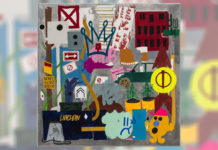
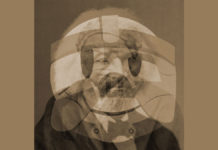
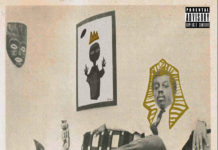
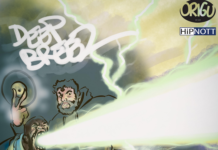

![The Underachievers – Crescendo [VIDEO]](https://www.birthplacemag.com/wp-content/uploads/2017/08/hqdefault-2-218x150.jpg)


![Fat Joe & Remy Ma ft. The-Dream – Heartbreak [VIDEO] Fat Joe Remy Ma The Dream - Heartbreak Video](https://www.birthplacemag.com/wp-content/uploads/2017/05/fat-joe-remy-ma-218x150.jpg)
![JSWISS featuring Chandanie – LML [VIDEO] JSWISS featuring Chandanie - LML [VIDEO]](https://www.birthplacemag.com/wp-content/uploads/2017/05/JSWISS-218x150.jpg)

![Akinyemi Ends Summer With “Summers” EP Release Show [9-17-17] Akinyemi 'Summers' EP release show at Brooklyn Bazaar](https://www.birthplacemag.com/wp-content/uploads/2017/09/summers-featured-218x150.jpg)
![4th Annual NYC VS EVERYBODY Yacht Party [9/16/17] #VSYacht 4th annual NYC VS Everybody Yacht Party#VSYacht](https://www.birthplacemag.com/wp-content/uploads/2017/09/vsyacht-218x150.jpg)

